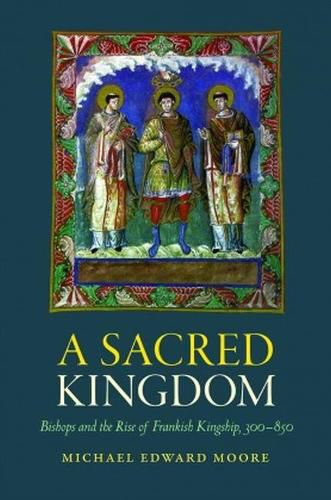Readings Newsletter
Become a Readings Member to make your shopping experience even easier.
Sign in or sign up for free!
You’re not far away from qualifying for FREE standard shipping within Australia
You’ve qualified for FREE standard shipping within Australia
The cart is loading…






Over a period of some five centuries, Europe was transformed by the emergence of barbarian kingdoms in the regions of the former Roman Empire. In the turbulent post-Roman world, the Christian church and its bishops had considerable sway, as these kingdoms developed new institutions such as Christian kingship. Warlike kingdoms competed with each other and took on projects of political consolidation, religious accommodation, and conversion. Religious imperatives shaped the understanding of political culture, alongside aristocratic consensus and cooperation. The Franks ultimately dominated Europe and built a great empire, pursuing a doctrine of missionary warfare. Carolingian kings and nobles were mobilized by a religiously saturated ideology and by the appeal of an aggressive and expansionist political order.
Throughout these changes, bishops played a guiding role. Their special garments, liturgies, and hairstyle indicated their character as a priestly brotherhood, set apart from the rest of society, whose task was to regulate the affairs of men and ensure the benevolence of God. The function of bishops as a cohesive religious order, and their collaboration with kings, meant that their ideas had a special prestige. By their blessings bishops could protect crops, houses, and even the kingdom and its warriors. By their mastery of laws–canon, Roman, and barbarian–the bishops grasped the right nature of the social order and indicated to others God’s plan for the world.
Drawing on the records of nearly 100 bishops’ councils spanning the centuries, alongside royal law, edicts, and capitularies of the same period, this study details how royal law and the very character of kingship among the Franks were profoundly affected by episcopal traditions of law and social order.
$9.00 standard shipping within Australia
FREE standard shipping within Australia for orders over $100.00
Express & International shipping calculated at checkout
Over a period of some five centuries, Europe was transformed by the emergence of barbarian kingdoms in the regions of the former Roman Empire. In the turbulent post-Roman world, the Christian church and its bishops had considerable sway, as these kingdoms developed new institutions such as Christian kingship. Warlike kingdoms competed with each other and took on projects of political consolidation, religious accommodation, and conversion. Religious imperatives shaped the understanding of political culture, alongside aristocratic consensus and cooperation. The Franks ultimately dominated Europe and built a great empire, pursuing a doctrine of missionary warfare. Carolingian kings and nobles were mobilized by a religiously saturated ideology and by the appeal of an aggressive and expansionist political order.
Throughout these changes, bishops played a guiding role. Their special garments, liturgies, and hairstyle indicated their character as a priestly brotherhood, set apart from the rest of society, whose task was to regulate the affairs of men and ensure the benevolence of God. The function of bishops as a cohesive religious order, and their collaboration with kings, meant that their ideas had a special prestige. By their blessings bishops could protect crops, houses, and even the kingdom and its warriors. By their mastery of laws–canon, Roman, and barbarian–the bishops grasped the right nature of the social order and indicated to others God’s plan for the world.
Drawing on the records of nearly 100 bishops’ councils spanning the centuries, alongside royal law, edicts, and capitularies of the same period, this study details how royal law and the very character of kingship among the Franks were profoundly affected by episcopal traditions of law and social order.